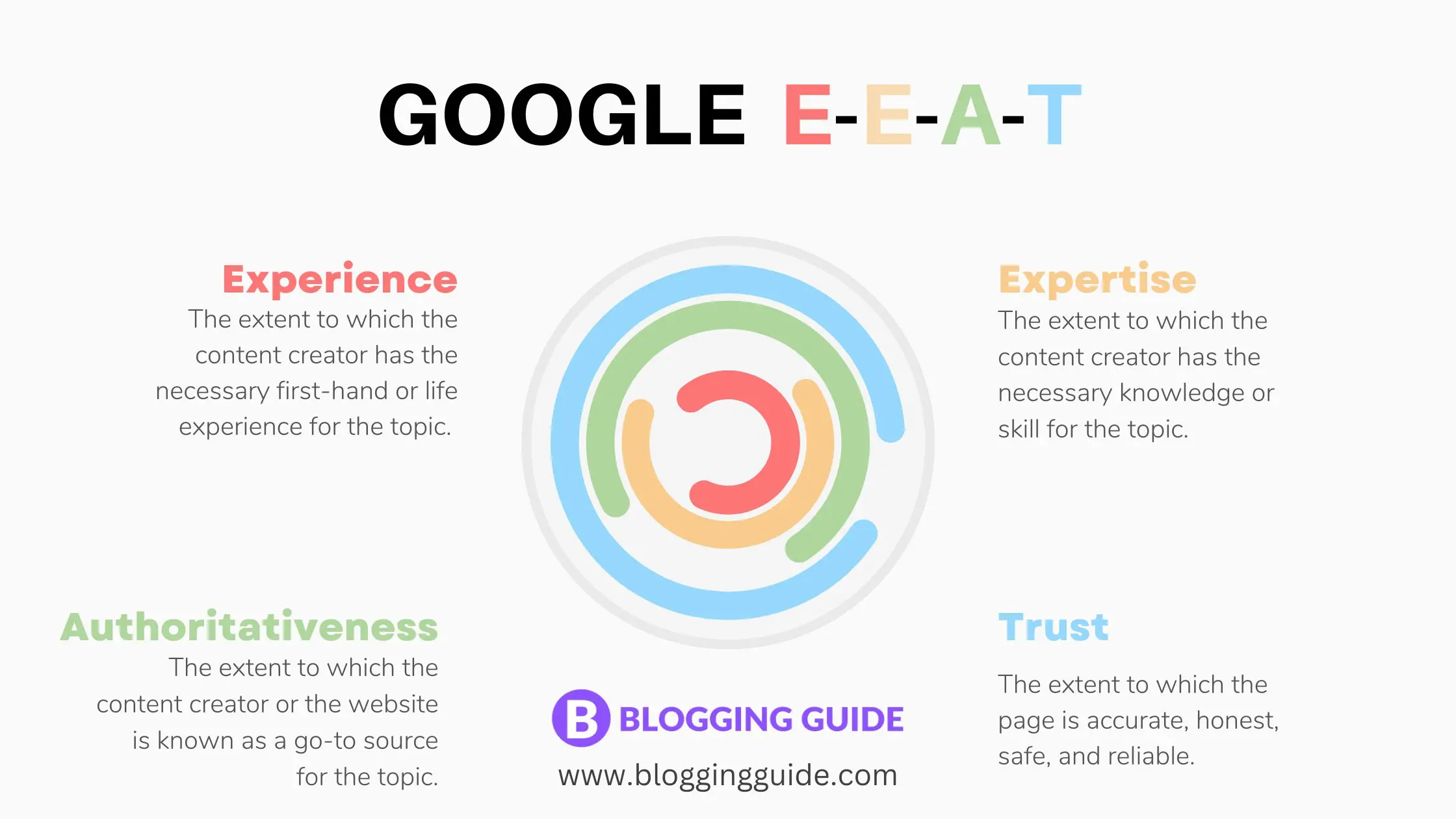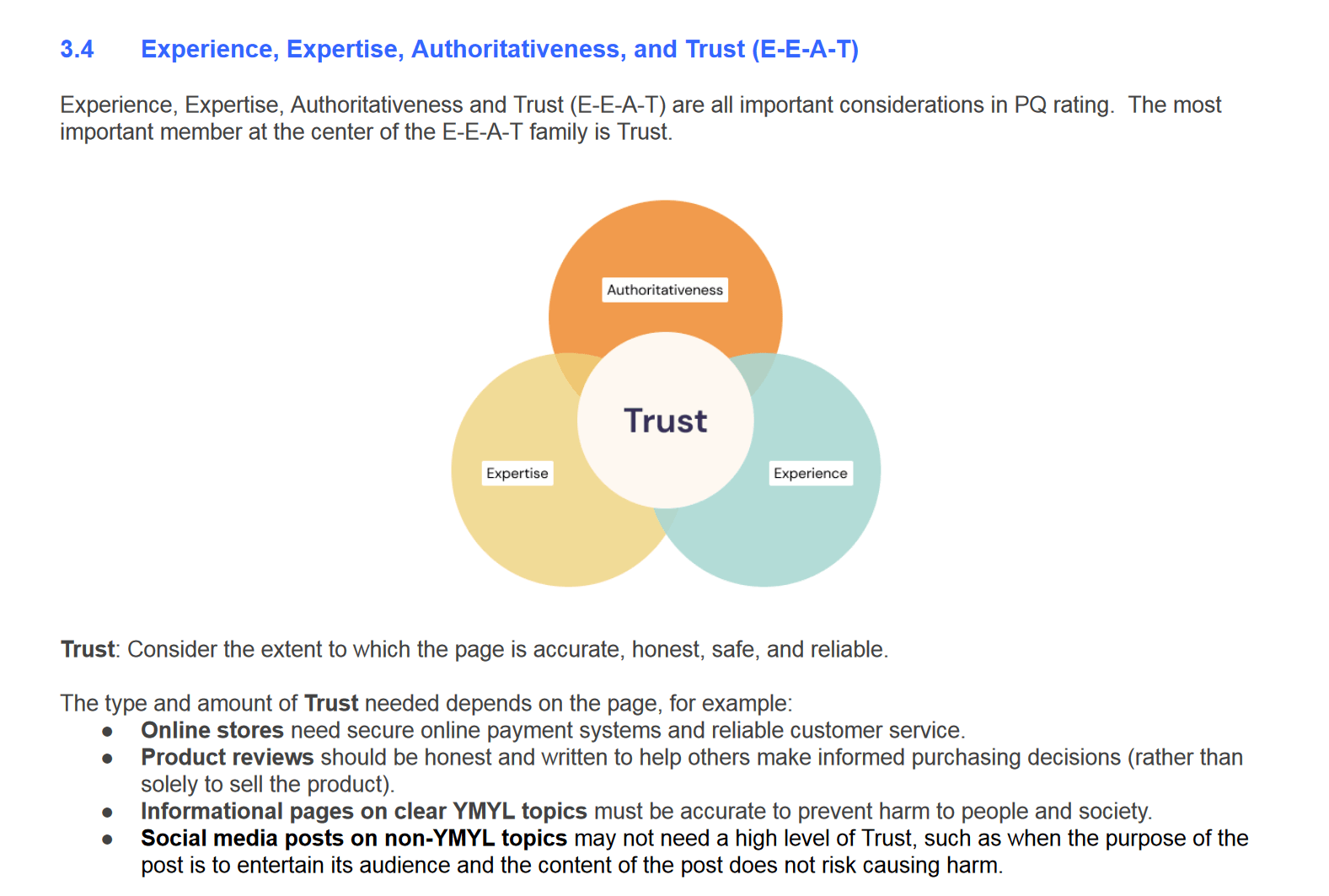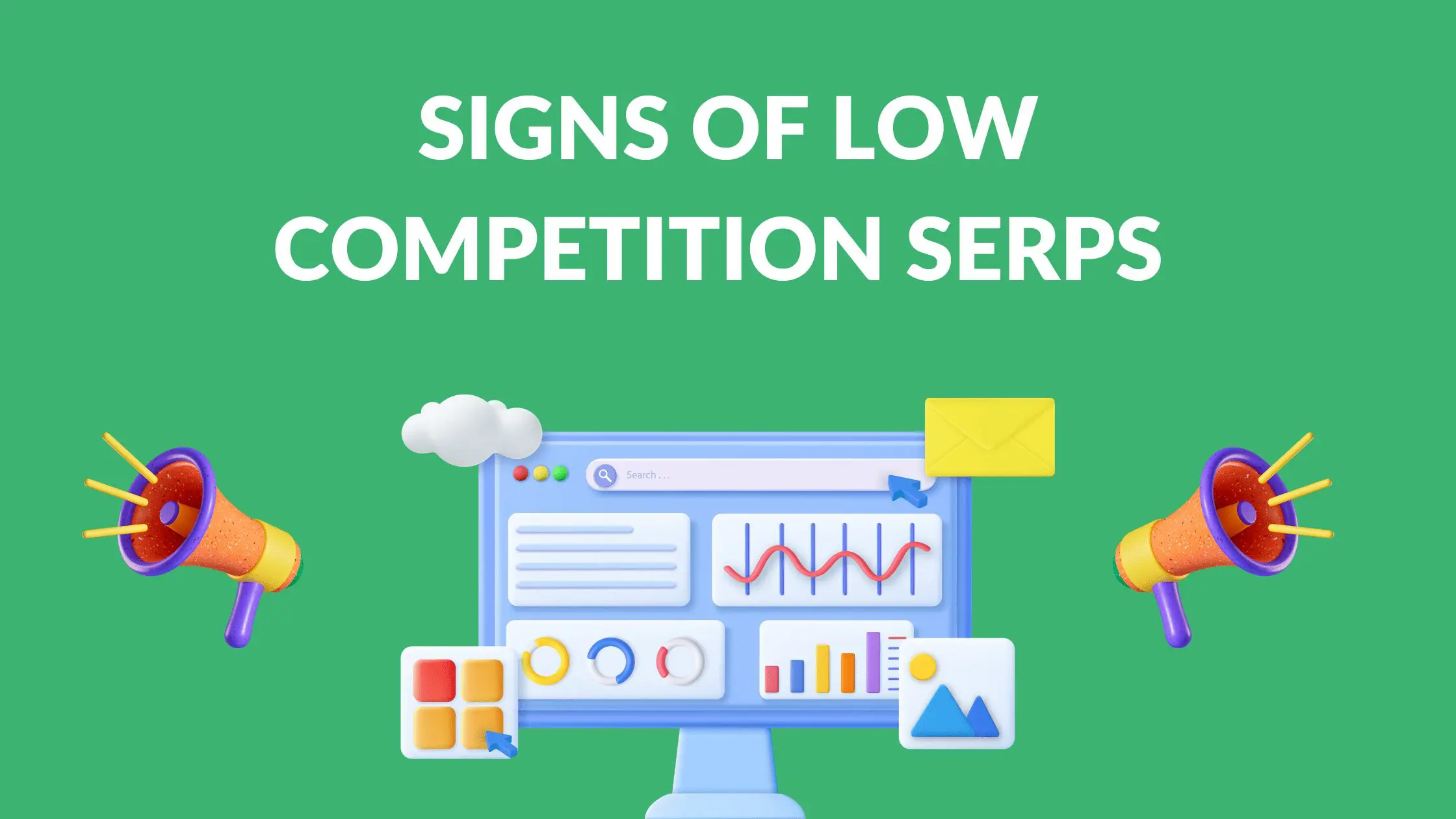What is YMYL Content (YMYL Meaning for SEO & Niche Blogs)?

Written by Casey Botticello
Disclosure: Some of the links below are affiliate links, meaning that at no additional cost to you, I will receive a commission if you click through and make a purchase. Read our full affiliate disclosure here.
Your Money or Your Life. Relax, this isn’t a robbery. It’s content. When it comes to blogging, YMYL content doesn’t refer to making an impossible choice – it’s talking about an information type that makes it seem that way. But what is YMYL content, and how does it affect blog SEO?
YMYL content has a major impact on your blog’s SEO.
Google’s Search Quality Rater Guidelines (SQRG) cover the concept a lot, affecting how they measure page quality and influencing how Google ranks them.
The information covered in YMYL content topics is important, and Google knows it. YMYL content and blog SEO work hand-in-hand with E-E-A-T principles, and both concepts heavily influence your SEO.
But before we get tied up in too many acronyms, understanding YMYL content and how it fits into your blogging strategy matters. Especially when you realize how much it affects your blog.
This article unpacks the ins and outs behind understanding what is YMYL content, helping you to understand what it is and how it can work for (or against) your blog’s SEO ambitions. We’ll break down the terminologies, factors, and roles behind these concepts and policies and explore how E-E-A-T for blogs principles help your blog’s posts to feature content that ranks higher, reaches more people, and makes a bigger difference.
What is YMYL Content & How Does It Affect Blog SEO?

While YMYL content mentions two important blogging prescripts (money and life), there’s obviously more to it than that. YMYL content in blogs refers to any content that, according to Google, can play a big role or significantly impact the reader’s life or money.
More specifically, YMYL content refers to pages or topics that can affect a person’s financial well-being, mental and physical health, happiness, and personal safety. Google sees this content as high-impact, and the search engine assigns extra importance to how YMYL content and blog SEO influence each other.
Search Quality Raters
The search engine uses third-party Search Quality Raters (highly-trained people who help Google improve search results) to categorize content for them, review web page quality, and identify YMYL content candidates. These raters are guided by an extensive set of guidelines called Search Quality Rater Guidelines (SQRG) – here’s a summary overview of them – which references YMYL content and E-E-A-T frequently.
These guidelines explain how to determine which content is best for their search function and which isn’t. While their feedback doesn’t directly impact how Google ranks search results, they are important to how the search engine updates and refines its algorithm. You can view the full 176-page December 2022 updated guidelines here (the YMYL content section is on page 11).
Blogging & YMYL Content in Blogs
News agencies, banks, hospitals, and government websites all post YMYL content online. This is because what they say can make a big impact on their readers. The same goes for YMYL content in blogs.
If you’re blogging about making party decorations, your content isn’t going to change the trajectory of someone’s life. A badly-researched ‘how-to’ post that misses an important step for streamers is going to leave someone’s get-together looking a little threadbare – that’s all.
Google Wants Accurate, Safe, Dependable Content
However, if you’re operating within a niche like personal finance or healthcare, depending on the information you’re providing and to whom, your content can make a big impact.
Suggesting that your readers sink all their savings into an ill-advised “sure thing” or providing inaccurate home remedies for serious illnesses, only for the investment to fail or someone to end up in the ER (or worse) is why Google introduced the concept of YMYL in the first place – to help them separate the good content from the bad and to deliver better search results that can help people in a real way.
This protects users, ensures only top, accurate, dependable content gets ranked, and allows the search engine to distinguish between real, high-quality bloggers and inaccurate content or spam. And this can have a big impact on your blog SEO – especially when it comes to E-E-A-T for blogs, but we’ll get to that later.
How YMYL has Evolved
To help them do this, Google introduced the YMYL content concept with its revised rater guidelines. In subsequent updates and versions, these E-E-A-T have both grown progressively more influential in how YMYL content affects SEO. As more and more people turn to the internet as a primary information source, how quality content is measured has evolved to align more and more with YMYL content and E-E-A-T principles.
How Google Determines if Your Blog is YMYL Content
The SQRG outlines the most common categories and topics likely to include YMYL content. However, Google generally considers a page to contain YMYL content in blogs if:
- It can be seen as potentially harmful or dangerous, especially if the content is not accurate or trustworthy.
- It offers users advice on a serious or high-impact activity or topic.
- It contains information that can significantly impact someone’s life or well-being.
- It provides opinions that encourage the reader to take action that can have major consequences.
- It includes news on current events that may impact others and society negatively.
- It could seriously influence people’s financial, shopping, and product decisions.
- It could cause harm through social media sharing.
Raters are only there to deliver feedback and recommendations to Google. How the search engine ranks YMYL content depends on the raters’ interpretations of your content as well as other variables – all of which affect your SEO.
YMYL Content Topics

These topics are wide-ranging and can cover countless sub-categories. Many overlap with ‘non-YMYL’ topics, making it even tougher to determine if yours should be classified as such. Here’s a list of the most common topics Google sees as YMYL content.
Financial Information
This can be anything from providing market updates to publishing a detailed guide on investing for retirement during your adult life. Financial information-related topics are considered YMYL content because, while most people can use this information to make an informed decision, some may literally ‘take it to the bank.’
This can lead to big losses for the reader if they make the wrong decision due to inaccurate content. If the writer of the content is misinformed, inexperienced, or just plain wrong, this can have disastrous financial consequences for the reader.
Shopping & Product Reviews
When it comes to making purchasing decisions, almost everyone today relies on the information they see online. And while the majority of these purchases are smaller in nature, those ‘big ticket’ items can leave people out of pocket and, in some cases, broke.
From buying a house to purchasing a car, a business, or anything seen as very expensive or beyond someone’s financial means, the content related to high-value shopping is both common and a prime example of how YMYL content affects SEO.
Health & Medical
While the only genuinely trustworthy source of medical information is a qualified doctor, the internet is notorious for offering an endless stream of home remedies, treatments, cures, and medical fixes, most of which do not work. Providing incorrect or inaccurate medical information and health advice can have serious consequences.
There is a fine line between health and fitness topics that cover general diet and exercise advice and legitimate medical treatments and healthcare information. Google is looking for content that has been created by qualified medical experts or which has been reviewed and endorsed by them.
News & Current Events
In the age of misinformation, fake news and false stories can lead to panic, fear, and social disruption. Google is working hard to find ways to prevent the spread of nefarious stories and reports created to mislead readers.
Content that covers developing stories or which can be seen as a current information source that, if incorrect, can hurt people, falls into the YMYL content category. This can include local and international political events, economic news, civil happenings, and anything that can cause people to react to the stories they’re reading.
Law, Civil Society & Government
Most government agencies, departments, and organizations have their own websites publishing approved and accurate content. The same goes for law firms and civil establishments. Any content that addresses the law, government policies, and civil or wider social concerns are considered YMYL content – and for good reason.
People searching for legal advice or information around serious civil issues likely require the most accurate and trustworthy content available to help them. Any incorrect, vague, or misleading content can leave them in big trouble.
Safety & Security
Personal safety is a rising concern among people around the world. From how to protect your family to workplace health and safety, emergency procedures, and even safe travel, content dealing with personal safety and group security fall into the YMYL content category.
Whether it’s advice on what to do in a disaster or tips on how to act in an emergency situation, understanding what is YMYL content as an important source of information that can literally save lives matters.
Impact of YMYL Content on SEO

So, how does YMYL content in blogs affect SEO? The end goal of any SEO strategy is to assist in creating content that Google sees as valuable and useful enough to rank high on SERPs. Content that covers YMYL topics is still subject to regular SEO principles, but Google pays a little more attention to it owing to its importance.
As Google continues to place higher premiums on content that satisfies searcher intent and is more relevant to what people are looking for, YMYL content policies have driven the direction in which content is being created.
By giving more attention to more important topics that have bigger impacts on people’s lives, the search engine’s rankings factors place more weight on the content elements that make people feel confident and have more faith in the results they see, tying YMYL content and blog SEO together.
It’s all about providing results that people can trust, that come from dependable sources, and that contain genuine, accurate, and usable information.
This is where E-E-A-T for blogs comes in.
How E-E-A-T Principles Relate to YMYL Topics

You’ve probably heard about the emphasis Google now places on something called “E-E-A-T.” E-E-A-T (formerly ‘E-A-T’) is a concept that Google uses to rank results based on how well a website can demonstrate certain characteristics that make content more relevant and helpful.
While E-E-A-T is not a direct SEO ranking factor, it is an essential element of YMYL content and blog SEO that has been around since 2014. Recently – since 2018’s infamous Medic Update in particular – E-E-A-T has begun to evolve into one of the most important factors the search engine uses to rate the quality of a webpage. Here’s a quick overview of what each element is all about:
E – Experience (Proof you’ve ‘been there & done that’)
This is a new (2022) addition to the original ‘E-A-T’ concept – this article provides the details. Google is looking to see if the content’s creator can show that they have real experience with the topic. The author should try to demonstrate that they have first-hand, real-world knowledge of the topic. Raters look for historical associations and evidence that the creator is indeed experienced on a topic.
E – Expertise (Backed up by qualifications & certifications)
Here, Google is looking for proof or evidence of qualifications or demonstrable skills the author possesses to support the assumption that they know what they’re talking about. Content written by professionals or experts roped in to contribute will give credence to it boasting ‘expertise.’ Expertise can also be everyday proficiency, which doesn’t necessarily come with credentials, so authors need to find other ways to prove their comprehensive skills.
A – Authoritativeness (Website & content is highly regarded by others)
This E-E-A-T for blogs component relates to how others view the creator’s content and reputation. People who publish content that the online community respects and associates with excellence are considered authoritative. Content (as well as the website and creator themself) endorsed by other high-level brands and influencers is often seen as authoritative.
T – Trustworthiness (Content is seen as ‘honest’ & verifiable)
Verifiable facts, legitimate sources, accurate citations, relevance, site transparency, security – all of these elements contribute to Google seeing your content as trustworthy. Raters want to be able to know who wrote your content, that they can contact you, and that you’re not hiding anything. This is a crucial factor, especially when it comes to ranking for YMYL content.
Now that you’ve got the low-down on what E-E-A-T is all about, you can see why it is so important to understand what is YMYL content and how YMYL content affects SEO. E-E-A-T principles ensure that content is safe and dependable enough to provide real value to people. And when content is safe and valuable, it ranks well.
How to Improve EEAT for Blogs Covering YMYL Topics

There are countless factors influencing blog SEO. From off-page and technical SEO elements to keyword research strategies, the length of your content, and even how well your images are optimized, nailing your SEO can be challenging.
But when it comes to that all-important on-page SEO – the SEO that directly influences how Google ranks your written content – ensuring your E-E-A-T, YMYL content and blog SEO boxes are checked will see you surging up those SERPs.
Improving your E-E-A-T elements will ensure that your content is more likely to be considered YMYL content and reinforces your overall blog SEO performance. Here are some effective techniques for improving your E-E-A-T scores:
Boost experience by demonstrating your know-how
Be patient and lay your YMYL content in blogs foundation first. Google is unlikely to rank new websites in YMYL content topic searches straight out of the gate. You’re probably going to have to wait a while. Use the time to actively participate in forums, engage with communities, and increase your social media footprint.
Add some expertise with real experts
Unless you’re a qualified doctor or veteran banker, you’ll unlikely be seen as an expert in the medical or finance niches. But that doesn’t mean you can’t bring in the professionals. Ask verifiable experts for their opinions or direct contributions and list them as contributing creators. Interviews are also a great expertise addition to your content.
Improve your authority by getting recognized
Collaborate with top-level brands and influencers, secure endorsements from industry experts and societies, and reinforce your backlinking strategy to earn quality backlinks from top sources. This is a tough but powerful step that can massively add to your rankings and overall SEO potential.
Demonstrate trustworthiness by being as open and honest as possible
From listing only vetted and approved sources and citations to doing everything you can to show people that you’ve got nothing to hide, earning trust is vital to your content making it onto a YMYL topic SERP. Clearly indicate who created your content, who you are, and how people can contact you.
Conclusion
What is YMYL content? It’s a principle, a concept, a roadmap for ensuring people are getting the most relevant, accurate and worthy information when they need it. YMYL content in blogs can be a difficult topic category to succeed in, owing to Google’s strict policies around rating and ranking it. But it can also be extremely profitable and give you a powerful competitive advantage over the competition – if you can get it right.
While nailing your E-E-A-T principles will get you onto those SERPS, figuring out how YMYL content affects SEO allows you to take your content to the next level, so always remember YMYL content and blog SEO basics. Create only high-quality content that people will share and link back to your site, and don’t forget to update it regularly to reflect any changes or new information within a topic.
Avoid publishing misinformation and delete or update low-quality information or outdated posts. Keep your brand image squeaky clean, and always try to satisfy user intent with the most accurate and useful information you can provide.
Providing high-quality content is one thing. Providing high-quality content that is considered worthy of appearing in the most important SERPs and which can make a difference in people’s lives is both noble and great for blog SEO.



